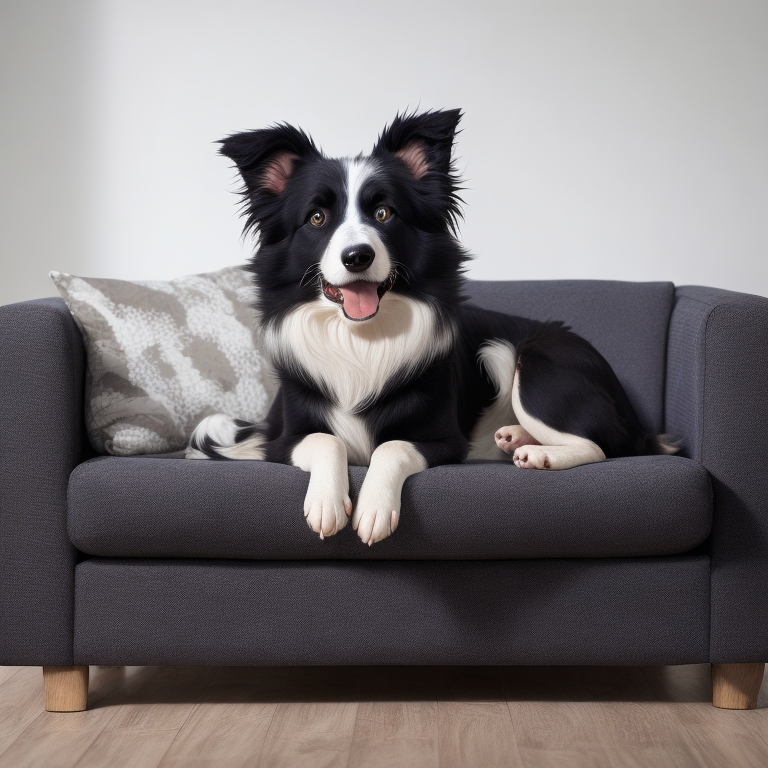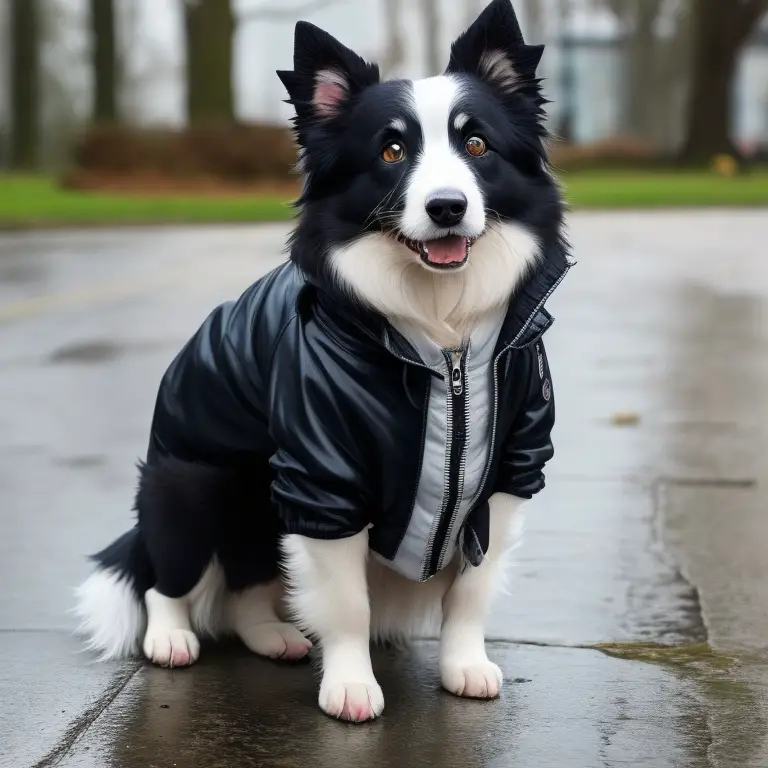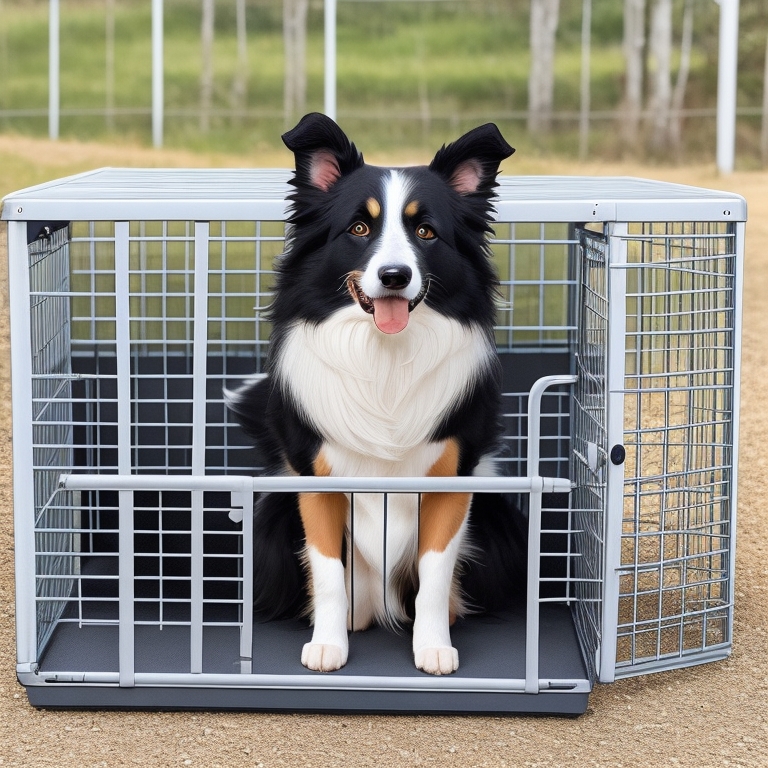Are Border Collies Prone To Separation Anxiety?
Have you been considering getting a Border Collie as a pet? Border Collies are intelligent, energetic, and great companions, but they may be more prone to separation anxiety than other breeds.
Separation anxiety is a serious condition that affects many dogs, and it can lead to destructive behavior when left alone.
In this article, we’ll explore the causes and symptoms of separation anxiety in dogs, particularly Border Collies. We will also discuss how to detect, prevent, and treat this condition to help your furry friend live a happy and healthy life.
So, let’s dive in and learn all about Border Collies and separation anxiety.
| Factors | Border Collies | Other Dog Breeds |
| Prevalence of Separation Anxiety | Higher than average | Varies by breed |
| Activity level | High energy, require adequate exercise and mental stimulation | Varies by breed |
| Training | Highly trainable, respond well to positive reinforcement-based training | Varies by breed |
| Family Structure | Prefer to be with their owners, may hyperventilate, whine, or become destructive when left alone | Varies by breed |
| Ancestry | Bred as a working breed to be with their owner, may have a genetic predisposition to separation anxiety | Varies by breed |
What Is Separation Anxiety?
Causes of Separation Anxiety in Dogs
Separation anxiety is a condition that is common among dogs, particularly those breeds that are known for their attachment to their owners like Border Collies. There are several factors that can cause separation anxiety in dogs, including genetics and breeding, environment and upbringing, and lack of exercise or mental stimulation.
Genetics and breeding play a significant role in the development of separation anxiety in dogs.
Some breeds, like Border Collies, are more prone to the condition due to their genes. Dogs that have been adopted from shelters or rescues may also be more likely to develop separation anxiety due to their history.
Environmental factors and upbringing are also contributing factors to separation anxiety.
Dogs that have been separated from their mothers or littermates too early may develop the condition, as well as dogs that have been neglected or abused. Changes in the dog’s routine or environment, such as moving to a new home or having a new pet or family member introduced, can also lead to separation anxiety.
Lack of exercise or mental stimulation can also be a cause of separation anxiety in dogs.
Dogs that do not get enough physical or mental stimulation may exhibit destructive or anxious behavior when left alone. It’s important to make sure that your dog is getting enough exercise and mental stimulation to help prevent or treat separation anxiety.
Separation anxiety can be caused by genetics, environment and upbringing, and lack of exercise or mental stimulation.
It’s important to understand the causes of separation anxiety in order to prevent or treat this condition effectively.
Symptoms of Separation Anxiety in Dogs
Separation anxiety is a common issue among dogs, including Border Collies. It can be distressing for both the dog and the owner.
Here are some of the symptoms to look out for:
- Excessive barking and howling
- Destructive behavior, such as chewing furniture or digging holes
- Pacing or restlessness
- Going potty inside the house, even if they are trained to go outside
- Loss of appetite or overeating
- Excessive drooling or panting
- Becoming overly excited or hyperactive when the owner returns home
- Attempting to escape or break out of the house or crate
If your Border Collie exhibits any of the above symptoms when left alone, they may have separation anxiety. It is important to address this issue as soon as possible for the well-being and happiness of your dog.
Are Border Collies More Prone to Separation Anxiety?
Genetics and Breeding
When it comes to separation anxiety in Border Collies, genetics and breeding can play a role. Border Collies were originally bred for herding and working alongside their human companions, which means they are highly social and tend to bond strongly with their owners.
Unfortunately, this can also mean that they are more prone to separation anxiety when left alone for extended periods of time.
Additionally, some Border Collies may have a genetic predisposition to anxiety or fearfulness, which can increase their likelihood of developing separation anxiety. It’s important to note that while genetics and breeding can contribute to separation anxiety in Border Collies, it’s not the only factor.
Environment, upbringing, and exercise also play a significant role in a dog’s behavior and overall well-being.
If you have a Border Collie and are concerned about their tendency toward separation anxiety, it’s important to provide socialization, training, and plenty of mental and physical stimulation to help alleviate their stress and anxiety when you’re away. Seeking the advice of a professional trainer or veterinarian may also be beneficial in managing your Border Collie’s separation anxiety.
Environment and Upbringing
If you’re wondering about whether Border Collies are more prone to separation anxiety, it’s vital to explore their environment and upbringing. An unsuitable environment or neglectful upbringing can lead to separation anxiety in any dog, regardless of breed.
Border Collies need regular exercise, socialization, attention, and mental stimulation to stay physically and mentally healthy and happy.
This breed is highly active and intelligent, so any negligence in providing these essential needs can result in anxiety, behavioral issues, and other health concerns. If you’re a Border Collie owner, it’s crucial to provide a suitable home environment that meets their needs.
This means ensuring they have adequate space, toys, and regular exercise routines.
Additionally, you must give them enough attention and care. Neglecting their care can lead to anxiety and other health issues.
While genetics and breeding play a role in a dog’s predisposition to separation anxiety, their environment and upbringing can also increase the risk.
Therefore, providing an adequate environment for your Border Collie is critical in preventing and managing separation anxiety.

Exercise and Mental Stimulation
Border Collies are a highly intelligent and energetic breed that require plenty of exercise and mental stimulation. A lack of exercise and mental stimulation can lead to boredom, which can then escalate into anxiety and destructive behaviors when left alone.
Border Collies that do not receive enough physical activity and mental stimulation are more prone to separation anxiety.
To prevent separation anxiety, it’s important to provide your Border Collie with plenty of opportunities for exercise and mental stimulation. Regular physical activity and games of fetch or frisbee can help keep your dog’s mind and body engaged.
Interactive toys, puzzle feeders, and obedience training are also effective ways to keep Border Collies mentally stimulated.
Aim to provide your Border Collie with plenty of outdoor activities, such as hiking, swimming, and agility courses, to keep their mind and body engaged. When you’re unable to provide physical exercise, mental stimulation can be achieved through activities such as obedience training, puzzle feeders, and interactive toys.
In addition to physical activity, consistent training can also help prevent separation anxiety in Border Collies.
Training sessions can provide them with mental stimulation that can improve their problem-solving skills and intelligence. It’s essential to stay consistent with training and provide positive reinforcement.
Ultimately, Border Collies require both physical exercise and mental stimulation to prevent separation anxiety.
With proper exercise and mental stimulation, they can live happy and healthy lives.

How to Detect Separation Anxiety in Border Collies?
Recognizing Symptoms
Recognizing Symptoms: Being able to detect separation anxiety in your Border Collie is the first step towards managing this condition. Here are some common symptoms to look out for:
- Excessive barking or howling when left alone
- Destructive chewing or digging
- Soiling in the house even when house-trained
- Trying to escape or damage doors, windows, or other barriers
- Excessive drooling or panting
- Pacing or restlessness
- Refusing to eat or drink when alone
Keep an eye out for these behaviors when you leave your Border Collie alone. If you notice these symptoms occurring frequently and intensively, then your dog might be showing signs of separation anxiety.
However, remember that not all of these behaviors necessarily indicate separation anxiety, so it’s critical to monitor your dog and get help from a professional if needed.
Monitoring Behavior at Home
To detect separation anxiety in your border collie at home, monitoring their behavior is crucial. Some of the common signs to look out for include destructive behavior, excessive barking or whining, pacing, and drooling.
Your dog may also become overly clingy or display signs of depression when you are about to leave the house.
Therefore, it’s essential to maintain a record of your dog’s behavior by installing a video camera or recording device in your home. By doing this, you can monitor how your dog behaves when you’re not around.
Also, observe how they react when you are getting ready to leave the house.
If you notice any unusual or concerning behavior, pay attention to its duration and severity. Document everything that you observe, including their behavior before and after leaving the house.
This information will help your veterinarian and behaviorist diagnose any issues and provide the best possible course of treatment.
Seeking Professional Help
If you suspect that your Border Collie is suffering from separation anxiety, seeking professional help is crucial. A veterinarian or a certified dog behaviorist will be able to diagnose the problem and provide effective ways to manage the condition.
Here are some reasons why seeking professional help is essential:
- Accurate Diagnosis: A veterinarian or dog behaviorist will be able to identify whether your dog is suffering from separation anxiety or another medical condition. It is crucial to determine the underlying cause of your dog’s behavior to ensure that the right treatment is given.
- Tailored Treatment Plan: A behavioral specialist will tailor a treatment plan specific to your dog’s needs. It may include behavior modification techniques, training, and medication. Every dog is unique and will require individualized care to overcome separation anxiety.
- Ongoing Support: Dog behaviorists can provide ongoing support and guidance throughout the treatment process. It is essential to have an expert to guide you on the dos and don’ts when dealing with separation anxiety in your dog.
If you suspect your Border Collie is suffering from separation anxiety, seeking professional help is critical. It will give you peace of mind, accurate diagnosis, tailored treatment plans, and ongoing support to manage the condition effectively.
How to Prevent Separation Anxiety in Border Collies?
Socialization and Training
One of the ways to prevent separation anxiety in Border Collies is through proper socialization and training. Socialization involves exposing your dog to different people, animals, and environments from a young age.
This helps your Border Collie develop confidence and become comfortable in various situations, reducing anxiety when left alone.
Training is also crucial in preventing separation anxiety. Teaching your Border Collie basic obedience commands such as sit, stay, and come can help build a strong bond between you and your pet.
It also helps your dog feel more secure and less anxious when you are not around.
Additionally, it is essential to incorporate mental and physical stimulation into your Border Collie’s routine. This could include playing games, going for walks/runs, and providing interactive toys to keep your dog occupied and engaged.
By socializing your Border Collie, providing training, and keeping them mentally and physically stimulated, you could minimize their chances of developing separation anxiety.
Gradual Exposure to Separation
Gradual Exposure to Separation is an effective way to prevent separation anxiety in Border Collies. This method involves gradually extending the time you spend away from your dog until they can cope with your absence without getting anxious.
Start by leaving your dog alone for short periods of time, such as 5–10 minutes, and gradually increase the time as they learn to cope with being alone.
Make sure to give your dog something to do, such as leaving out puzzle toys or chews, to keep them occupied and engaged while you are away. It’s important to keep the environment calm and comfortable for your dog and to avoid fussing or creating a scene when leaving or returning.
This helps to establish a routine that your dog can become familiar with and feel secure in.
If you have to leave for extended periods, try to arrange for someone to look after your dog or consider doggy daycare as an option. This can provide your Border Collie with much-needed socialization and mental stimulation while keeping them from becoming anxious or destructive.
In summary, using the gradual exposure technique can help prevent separation anxiety in Border Collies.
With patience, practice, and consistency, you can teach your furry companions to feel secure and comfortable even when they are left alone.
Providing Mental and Physical Stimulation
To prevent separation anxiety in Border Collies, providing mental and physical stimulation is crucial. An active and intelligent breed like Border Collies needs regular exercise and mental stimulation to keep them engaged and prevent destructive behavior.
Here are some ways to provide mental and physical stimulation:
- Regular Exercise: Engage in activities that get your Border Collie moving and running, like taking long walks, going for a jog, or playing fetch.
- Interactive Toys: Provide interactive toys that keep your dog engaged and mentally stimulated, like puzzle toys and treat dispensers.
- Training and Tricks: Teach your Border Collie new tricks and provide regular training sessions to keep their minds engaged and challenged.
- Socialization: Take your Border Collie out for socializing with other dogs, as they are highly social and love to interact with new dogs and people.
- Mental Exercises: Engage your dog in mental exercises like hiding treats around the house or playing hide and seek games, which help to keep their minds active.
By providing mental and physical stimulation, you can prevent separation anxiety in your Border Collie and keep them happy and healthy.

How to Treat Separation Anxiety in Border Collies?
Behavioral Modification Techniques
Behavioral modification techniques involve changing the behaviors and habits of your Border Collie to reduce their separation anxiety. Here are some effective techniques:
- Desensitization: Gradually exposing your dog to situations that trigger their anxiety can alleviate their fear. For example, leaving them alone for short periods and gradually increasing the time as they adjust.
- Counterconditioning: Pairing the trigger of anxiety (such as you leaving) with something positive (like a treat or toy) can create a positive association and reduce anxiety.
- Calming exercises: Teaching your dog relaxation techniques, such as deep breathing or staying in a specific spot, can reduce their anxiety.
- Positive reinforcement: Rewarding your dog for calm behavior during times of separation can encourage them to repeat that behavior.
- Environmental changes: Making adjustments to your dog’s environment, such as providing a comfortable and secure space, can help reduce their anxiety.
Remember that behavioral modification techniques require patience and consistency. It’s essential to work with a certified dog trainer or behavior specialist to ensure effective and safe implementation.
In severe cases, prescription medication may be necessary to manage your Border Collie’s separation anxiety.

Medications
Medications are a common form of treatment for separation anxiety in Border Collies. These can include antidepressants, anti-anxiety drugs, and sometimes sedatives.
Antidepressants like fluoxetine can help regulate serotonin in the brain, improving mood and reducing anxiety.
Anti-anxiety medications like alprazolam and clonazepam can also be given to dogs, although they should be used cautiously as they can be habit-forming. Sedatives like acepromazine should only be used as a last resort and under the guidance of a veterinarian.
It’s important to note that medications should not be the only treatment used for separation anxiety.
Behavioral modification techniques, gradual exposure to separation, and mental and physical stimulation should also be incorporated into your dog’s treatment plan. If you’re considering medication for your Border Collie’s separation anxiety, consult with a veterinarian to discuss the best options and potential side effects.
Remember that every dog is different, and what works for one may not work for another.
Professional Help and Support
Professional help and support can be essential in treating separation anxiety in Border Collies. A veterinarian or a certified veterinary behaviorist can assist in creating a personalized treatment plan based on your dog’s behavior and medical history.
Furthermore, a professional dog trainer can teach you various techniques that can help your dog cope with their anxiety and reduce destructive behaviors.
They can also help you design an exercise and mental stimulation plan to keep your dog occupied and mentally stimulated during your absence. Additionally, support groups and online forums can provide you with the emotional support you need while dealing with separation anxiety in your Border Collie.
Sharing experiences with other pet owners who have faced the same challenges can provide the necessary encouragement and motivation for both you and your dog.
Professional help and support can significantly increase your chances of success in treating separation anxiety in your Border Collie. Do not hesitate to seek the help of experts if you are struggling with your dog’s anxiety.
Conclusion
Border Collies have been found to be more susceptible to developing separation anxiety than other dog breeds due to their strong bonds with their owners and instinctual herding tendencies. However, this does not mean that all Border Collies will develop separation anxiety, as environmental factors such as proper socialization, exercise, and mental stimulation can play a significant role in preventing this behavior.
It’s important to monitor your Border Collie’s behavior for signs of separation anxiety and seek professional help if necessary.
With the right care and training, Border Collies can live happy and healthy lives without experiencing separation anxiety. Let us all take the necessary steps to provide a comfortable and supportive environment for our furry friends.







